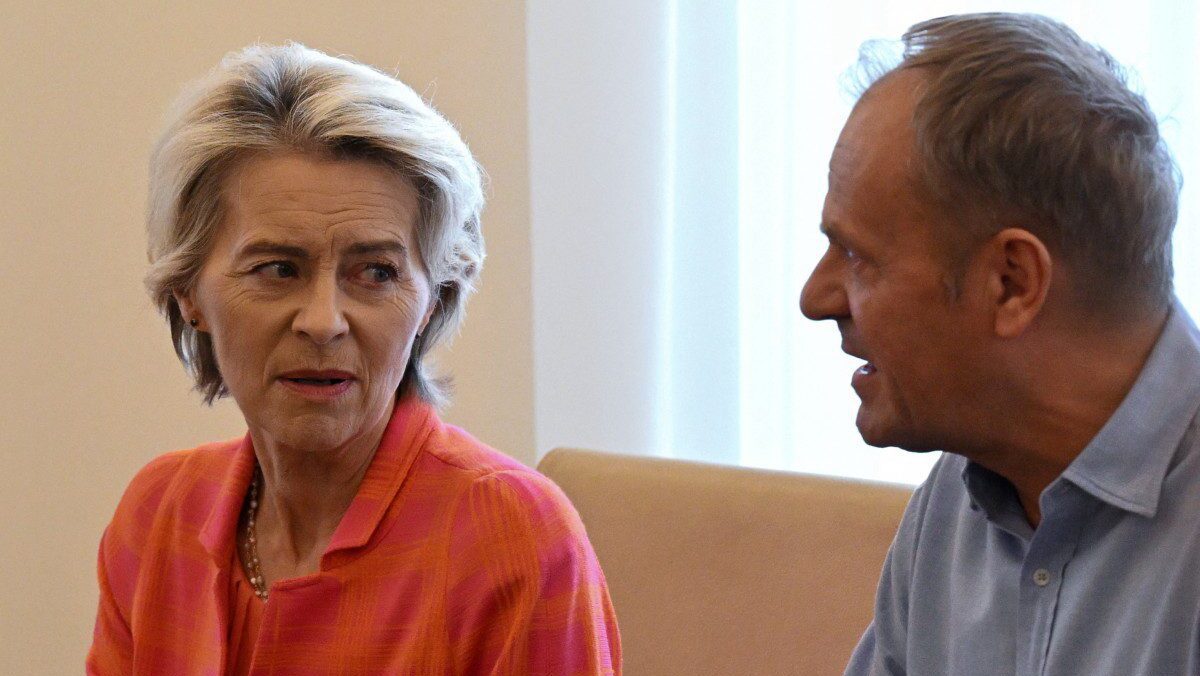
Poland’s Prime Minister Donald Tusk attends a meeting with European Commission President Ursula Von der Leyen on September 19, 2024.
Photo: Sergei GAPON / AFP
The Polish government has approved a new strategy on migration, including the possibility of temporarily suspending the acceptance of asylum claims if “immigrants threaten to destabilise the state.”
The move was announced by centrist Prime Minister Donald Tusk on Tuesday, October 15th. The strategy aims, among other things, to introduce a more targeted approach to granting visas to workers and students, as well as to encourage Poles living abroad to return.
„Odzyskać kontrolę. Zapewnić bezpieczeństwo” – czyli strategia migracyjna przyjęta. Decyzja trudna, ale bardzo potrzebna i oczekiwana.
— Donald Tusk (@donaldtusk) October 15, 2024
But the main focus in Polish political discourse is on the suspension of the right to claim asylum in Poland, a proposal that Tusk had already announced a few days earlier, at a rally on Saturday.
The new strategy will make it “possible, in the event of the threat of destabilisation of the state by an influx of immigrants, to temporarily and territorially suspend the right to receive asylum applications.”
The word “territorially” may refer to the border with Belarus. The neighbouring non-EU country has in recent years orchestrated a migration crisis in the region, receiving tens of thousands of migrants from the Middle East and Africa, and sending them to the EU’s borders, namely to Poland, Lithuania, and Latvia.
According to Poland’s border guard, there have been 27,900 attempts to illegally cross the Belarus border this year, slightly up from last year.
Warsaw and the Baltic states have accused Russia and Belarus of being complicit in destabilising the region as part of Moscow’s ‘hybrid warfare.’
In a speech to the parliament on Wednesday, Donald Tusk said he would protect his country’s eastern border, adding that “Poland cannot be and will not be helpless.”
Tusk hit back at criticism from human rights organisations and left-wing members of his coalition government who say refusing to accept asylum applications, even temporarily, breaks Poland’s constitution and international law:
Nobody is talking about violating human rights, the right to asylum, we are talking about not granting applications to people who illegally cross the border in groups organised by [Belarus president] Lukashenko.
The four government ministers from The Left party alliance (Lewica) voiced opposition to the new strategy. The leader of the Left’s parliamentary group, Anna Maria Żukowska, said that her group is opposed to suspending asylum rights and would not support any legislation to that effect.
Parliament speaker Szymon Hołownia, who leads the centrist-liberal Poland 2050 party, which forms part of the government, said Tusk was speaking only for his own party, and that the measures had not been discussed with coalition partners. “We are of the opinion that the right to asylum is sacred in international law,” he said in a Facebook post, adding that any suspension could only take place in a state of emergency.
The country’s president, Andrzej Duda—an ally of the opposition conservative Law and Justice party (PiS), which was in government between 2015 and 2023—said Tusk and his political allies have “finally joined the defenders of the borders of Poland.” He berated the prime minister for not having supported the actions of his conservative predecessors in government, and for having opposed the construction of a border barrier.
The question remains how EU institutions will react to Tusk’s new strategy. Migration is at the top of EU leaders’ agenda as the influx of illegal immigrants into Europe continues, and more and more EU member states decide to reintroduce checks at their borders. The matter will be discussed at an EU summit in Brussels on Thursday.
A European Commission spokesman on Monday said protecting EU borders was important but “member states have international and EU obligations including the obligation to provide access to the asylum procedure.”
The conservative government of Hungary has been punished for protecting its borders—which are also the EU’s external borders—as was the previous right-wing Polish government, which also endured attacks from the European Commission. In contrast, Brussels may approve Tusk’s strategy simply because he hails from Commission chief Ursula von der Leyen’s political family, the European People’s Party (EPP).
An analysis by German weekly Die Zeit claims that Poland’s announcement of suspending asylum claims only adds to the long list of compelling evidence that the EU’s migration policies don’t work anymore. Both Hungary and the Netherlands signalled their intention to opt out of the EU’s Migration and Asylum Pact, which forces member countries to choose between accepting migrants or paying hefty sums into a common fund.In addition, border controls between states in the border-free Schengen Area have increased in order to monitor the movement of migrants, with Hungarian Prime Minister Viktor Orbán warning that without a proper external defence system, Schengen will be dismantled as member states seek to find their own solution to address the migration crisis.
